Social Epistemology of Science by Aydin Mohseni
The British Journal for the Philosophy of Science, Aug 22, 2017
We consider how an epistemic network might self-assemble from the ritualization of the individual... more We consider how an epistemic network might self-assemble from the ritualization of the individual decisions of simple heterogeneous agents. In such evolved social networks, inquirers may be significantly more successful than they could be investigating nature on their own. The evolved network may also dramatically lower the epistemic risk faced by even the most talented inquirers. We consider networks that self-assemble in the context of both perfect and imperfect communication and compare the behaviour of inquirers in each. This provides a step in bringing together two new and developing research programmes, the theory of self-assembling games and the theory of network epistemology. 1 Introduction 2 The Basic Model 3 Equilibrium Analysis 4 Perfect Communication 5 Imperfect Communication 6 Discussion 7 Conclusion Brit.
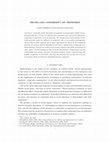
Erkenntnis, 2019
Typically, public discussions of questions of social import exhibit two important properties: (1)... more Typically, public discussions of questions of social import exhibit two important properties: (1) they are influenced by conformity bias, and (2) the influence of conformity is expressed via social networks. We examine how social learning on networks proceeds under the influence of conformity bias. In our model, heterogeneous agents express public opinions where those expressions are driven by the competing priorities of accuracy and of conformity to one's peers. Agents learn, by Bayesian conditionalization, from private evidence from nature, and from the public declarations of other agents. Our key findings are that networks that produce configurations of social relationships that sustain a diversity of opinions empower honest communication and reliable acquisition of true beliefs, and that the networks that do this best turn out to be those which are both less centralized and less connected.
The practice of HARKing—hypothesizing after results are known— is commonly maligned as underminin... more The practice of HARKing—hypothesizing after results are known— is commonly maligned as undermining the reliability of scientific findings. There are several accounts in the literature as to why HARKing undermines the reliability of findings. We argue that none of these is right and that the correct account is a Bayesian one. HARKing can indeed decrease the reliability of scientific findings, but it can also increase it; which effect HARKing produces depends on the difference of the prior odds of hypotheses characteristically selected ex ante and ex post to observing data. Further, we show how misdiagnosis of HARKing can lead to misprescription in the context of the
Philosophical Topics, 2023
Scientific curation, where scientific evidence is selected and shared, is essential to public bel... more Scientific curation, where scientific evidence is selected and shared, is essential to public belief formation about science. Yet common curation practices can distort the body of evidence the public sees. Focusing on science journalism, we employ computational models to investigate how such distortions influence public belief. We consider these effects for agents with and without confirmation bias. We find that standard journalistic practices can lead to significant distortions in public belief; that pre-existing errors in public belief can drive further distortions in reporting; that practices that appear relatively unobjectionable can produce serious epistemic harm; and that, in some cases, common curation practices related to fairness and extreme reporting can lead to polarization.
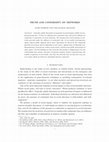
Erkenntnis
Typically, public discussions of questions of social import exhibit two important properties: (1)... more Typically, public discussions of questions of social import exhibit two important properties: (1) they are influenced by conformity bias, and (2) the influence of conformity is expressed via social networks. We examine how social learning on networks proceeds under the influence of conformity bias. In our model, heterogeneous agents express public opinions where those expressions are driven by the competing priorities of accuracy and of conformity to one's peers. Agents learn, by Bayesian con-ditionalization, from private evidence from nature, and from the public declarations of other agents. Our key findings are that networks that produce configurations of social relationships that sustain a diversity of opinions empower honest communication and reliable acquisition of true beliefs, and that the networks that do this best turn out to be those which are both less centralized and less connected.
The British Journal for the Philosophy of Science
We consider how an epistemic network might self-assemble from the ritualization of the individual... more We consider how an epistemic network might self-assemble from the ritualization of the individual decisions of simple heterogeneous agents. In such evolved social networks, inquirers may be significantly more successful than they could be investigating nature on their own. The evolved network may also dramatically lower the epistemic risk faced by even the most talented inquirers. We consider networks that self-assemble in the context of both perfect and imperfect communication and compare the behavior of inquirers in each. This provides a step in bringing together two new and developing research programs, the theory of self-assembling games and the theory of network epistemology.
Evolutionary Game Theory by Aydin Mohseni
The British Journal for the Philosophy of Science
We consider how an epistemic network might self-assemble from the ritualization of the individual... more We consider how an epistemic network might self-assemble from the ritualization of the individual decisions of simple heterogeneous agents. In such evolved social networks, inquirers may be significantly more successful than they could be investigating nature on their own. The evolved network may also dramatically lower the epistemic risk faced by even the most talented inquirers. We consider networks that self-assemble in the context of both perfect and imperfect communication and compare the behavior of inquirers in each. This provides a step in bringing together two new and developing research programs, the theory of self-assembling games and the theory of network epistemology.
In evolutionary games, equilibrium concepts adapted from classical game theory—typically, refinem... more In evolutionary games, equilibrium concepts adapted from classical game theory—typically, refinements of the Nash equilibrium—are employed to identify the probable outcomes of evolutionary processes. Over the years, various negative results have been produced demonstrating limitations to each proposed refinement. These negative results rely on an undefined notion of evolutionary significance. We propose an explicit and novel definition of the notion of evolutionary significance in line with what is assumed in these results. This definition enables a comprehensive analysis of the limitations of the proposed equilibrium concepts. Taken together, the results show that even under favorable assumptions as to the underlying dynamics and stability concept—the replicator dynamics and asymptotic stability—all equilibrium concept makes errors of either omission or commission; typically both.
Philosophy of Science, 2019
The replicator dynamics and Moran process are the main deterministic and stochastic models of evo... more The replicator dynamics and Moran process are the main deterministic and stochastic models of evolutionary game theory. The models are connected by a mean-field relationship—the former describes the expected behavior of the latter. However, there are conditions under which their predictions diverge. I demonstrate that the divergence between their predictions is a function of standard techniques used in their analysis and of differences in the idealizations involved in each. My analysis reveals problems for stochastic stability analysis in a broad class of games, demonstrates a novel domain of agreement between the dynamics, and indicates a broader moral for evolutionary modeling.
We consider how an epistemic network might self-assemble from the ritualization of the individual... more We consider how an epistemic network might self-assemble from the ritualization of the individual decisions of simple heterogeneous agents. In such evolved social networks, inquirers may be significantly more successful than they could be investigating nature on their own. The evolved network may also dramatically lower the epistemic risk faced by even the most talented inquirers. We consider networks that self-assemble in the context of both perfect and imperfect communication and compare the behavior of inquirers in each. This provides a step in bringing together two new and developing research programs, the theory of self-assembling games and the theory of network epistemology.
Philosophy of Science
The replicator dynamics and Moran process are the main deterministic and stochastic models of evo... more The replicator dynamics and Moran process are the main deterministic and stochastic models of evolutionary game theory. These models are connected by a mean-field relationship—the former describes the expected behavior of the latter. However, there are conditions under which their predictions diverge. I demonstrate that the divergence between their predictions is a function of standard techniques used in their analysis, and of differences in the idealizations involved in each. My analysis reveals problems for stochastic stability analysis in a broad class of games. I also demonstrate a novel domain of agreement between the dynamics, and draw a broader methodological moral for evolutionary modeling.
Within the framework of evolutionary game theory, equilibrium concepts adapted from rational choi... more Within the framework of evolutionary game theory, equilibrium concepts adapted from rational choice game theory are employed to identify the probable outcomes of evolutionary processes. Over the past several decades results have emerged in the literature demonstrating limitations to each of the proposed equilibrium concepts. These results rely on an undefined notion of evolutionary significance. We explicitly define evolutionary significance for evolutionary games. This definition enables an analysis of the success of equilibrium concepts across different models of evolution. We demonstrate that even under favorable assumptions as to the underlying dynamics and stability concept—the replicator dynamics and asymptotic stability—each equilibrium concept makes errors of either omission or comission; often both.
Experimental Philosophy by Aydin Mohseni
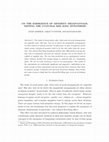
Synthese, 2019
The study of social justice asks: what sorts of social arrangements are equitable ones? But also:... more The study of social justice asks: what sorts of social arrangements are equitable ones? But also: how do we derive the inequitable arrangements we often observe in human societies? In particular, in spite of explicitly stated equity norms, categorical inequity tends to be the rule rather than the exception. The cultural Red King hypothesis predicts that differentials in group size may lead to inequitable outcomes for minority groups even in the absence of explicit or implicit bias. We test this prediction in an experimental context where subjects divided into groups engage in repeated play of a bargaining game. We ran 14 trials involving a total of 112 participants. The results of the experiments are statistically significant and suggestive: individuals in minority groups in these experiments end up receiving fewer resources than those in majority groups. Combined with previous theoretical findings, these results give some reason to think that the cultural Red King may occur in real human groups. 1 Adams and Freedman (1976); Freedman and Montanari (1980) discuss the prevalence of equity norms. Tilly et al. (1998) describes research on the prevalence of categorical inequity.
Synthese
The study of social justice asks: what sorts of social arrangements are equitable ones? But also:... more The study of social justice asks: what sorts of social arrangements are equitable ones? But also: how do we derive the inequitable arrangements we often observe in human societies? In particular, in spite of explicitly stated equity norms, categorical inequity tends to be the rule rather than the exception. The cultural red king hypothesis predicts that differentials in group size may lead to inequitable outcomes for minority groups even in the absence of explicit or implicit bias. We test this prediction in an experimental context where subjects divided into groups engage in repeated play of a bargaining game. We ran 14 trials involving a total of 112 participants. The results of the experiments are significant and suggestive: individuals in minority groups do indeed end up receiving fewer resources than those in majority groups.
AI Safety & Ethics by Aydin Mohseni
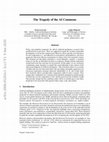
ArXiv, 2020
Policy and guideline proposals for ethical artificial-intelligence research have proliferated in ... more Policy and guideline proposals for ethical artificial-intelligence research have proliferated in recent years. These are supposed to guide the socially-responsible development of AI for the common good. However, there typically exist incentives for non-cooperation (i.e., non-adherence to such policies and guidelines); and, these proposals often lack effective mechanisms to enforce their own normative claims. The situation just described constitutes a social dilemma---namely, a situation where no one has an individual incentive to cooperate, though mutual cooperation would lead to the best outcome for all involved. In this paper, we use stochastic evolutionary game dynamics to model this social dilemma in the context of the ethical development of artificial intelligence. This formalism allows us to isolate variables that may be intervened upon, thus providing actionable suggestions for increased cooperation amongst numerous stakeholders in AI. Our results show how stochastic effects ...
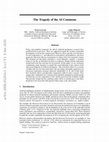
Synthese
Policy and guideline proposals for ethical artificial-intelligence research have proliferated in ... more Policy and guideline proposals for ethical artificial-intelligence research have proliferated in recent years. These are supposed to guide the socially-responsible development of AI for the common good. However, there typically exist incentives for non-cooperation (i.e., non-adherence to such policies and guidelines); and, these proposals often lack effective mechanisms to enforce their own normative claims. The situation just described constitutes a social dilemma-namely, a situation where no one has an individual incentive to cooperate, though mutual cooperation would lead to the best outcome for all involved. In this paper, we use stochastic evolutionary game dynamics to model this social dilemma in the context of the ethical development of artificial intelligence. This formalism allows us to isolate variables that may be intervened upon, thus providing actionable suggestions for increased cooperation amongst numerous stakeholders in AI. Our results show how stochastic effects can help make cooperation viable in such a scenario. They suggest that coordination for a common good should be attempted in smaller groups in which the cost for cooperation is low, and the perceived risk of failure is high. This provides insight into the conditions under which we should expect such ethics proposals to be successful with regard to their scope, scale, and content.











Uploads
Social Epistemology of Science by Aydin Mohseni
Evolutionary Game Theory by Aydin Mohseni
Experimental Philosophy by Aydin Mohseni
AI Safety & Ethics by Aydin Mohseni